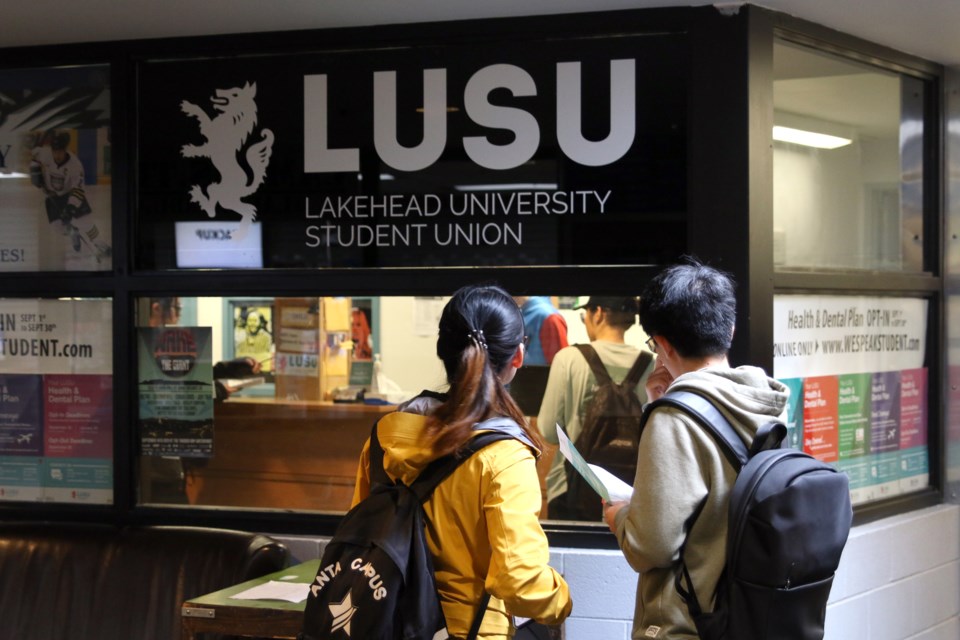THUNDER BAY - A new initiative at universities across the province gives students more say when it comes to what student services and programs they are willing to pay for, but student union officials at Lakehead University worry if more students choose to opt-out of paying, these services will disappear altogether.
“It is not great news at all because I myself as a student at Lakehead benefited a lot from services the student union has been providing for students,” said Lakehead University Student Union president, Masoud Manzouri.
“I was one of those students who worked my way up through LUSU. I think at the end of the day, what we are looking at, is students will be less experienced when they graduate and less supports and services will be available for them during their studies.”
Universities across the province now follow the Student Choice Initiative - a policy developed by the Ford Government under the Ministry of Training, Colleges, and Universities. The initiative allows students to choose to opt-in or opt-out of paying various ancillary fees as part of their tuition.
Students are required to choose which fees they will pay when registering. Opting out of all ancillary fees would save a student approximately $180 at Lakehead. Those who have opted-out can opt-back in anytime throughout the year.
Certain fees remain mandatory, such as those related to health and wellness, recreation, and transit.
“Besides that, all of the other fees and services LUSU has provided are now non-essential or optional,” Manzouri said.
These other fees cover various programs and support services for students, including Aboriginal Programming, the African Caribbean Student Association, Outdoor Recreation Student Society, the Graduate Student Association, academic and advocacy support services, and LU Radio.
Other programs through the LUSU activity fee include clubs and centres, such as the Gender Equity Centre, Pride Central, and the Food Bank.
“The funding that would go through those centres and programs are now optional,” Manzouri said. “We had to shut down one of the centres we had last year and we have had for so many years, the Sustainability Initiative.”
Centres will see staffing reductions, including reducing a full-time coordinator position to part-time and eliminating one of two student assistant positions.
Manzouri said looking ahead to next year, LUSU may have re-budget to prevent these centres from shutting down completely.
“So it means that maybe some of the centres we have to shut them down or combine some of the centres,” he said. “For sure the services LUSU has been providing has been really affected.”
Similar initiatives have been used at universities in Australia and New Zealand, which uses voluntary student unions.
“The information that we have is between five and 30 per cent of students opted-in in those countries,” Manzouri said. “What we are expecting for students to opt-in across provincial universities, specifically in LUSU, less than 20 per cent of students to opt into those fees.”
Students on campus appear to like having the option to select which ancillary fees they pay, but also like that the university and student union do offer so many varied services to students who need them.
First-year student, Danika Reid, said even though cuts to the Ontario Student Assistance Program has made affording tuition more difficult, she chose to opt-in for several fees, including centres like Pride Central and the Gender Equality Centre.
“I did not opt-out of those because I thought it was really amazing that the school has those centres,” she said. “I was happy they had them and I decided to make a choice that I could support them.”
“I hope other students do opt-in because everyone should have a choice and have places to go if they feel uncomfortable or if they just need to talk to someone and these centres, it’s amazing that Lakehead University has them.”
For third-year student, Eric Martin, the opting-in/opting-out does present students with a lot more decisions that were never really there before, but he too wanted to support the services being offered by the student union.
“I ended up supporting many of the options that I use frequently, like the Food Bank, the Gender Equality Centre, Pride Central,” he said. “I think there are other things on campus that need improving. As far as funding goes, there is always a need for more. I don’t think the opt-in/opt-out system will get help us get to the campus that we need to be.”
The Student Union will not know how many students have opted-in or out of fees until early October, Manzouri said, when they receive a report from the university.
He added that he is keeping his fingers crossed that most students will choose to opt-in to paying the fees.
For Martin, even if you don’t see a particular service as valuable, another student might.
“I think the services provided on campus are crucial and necessary and are beneficial to students so I think they should continue to be funded, if people perceive their value or not,” he said.
